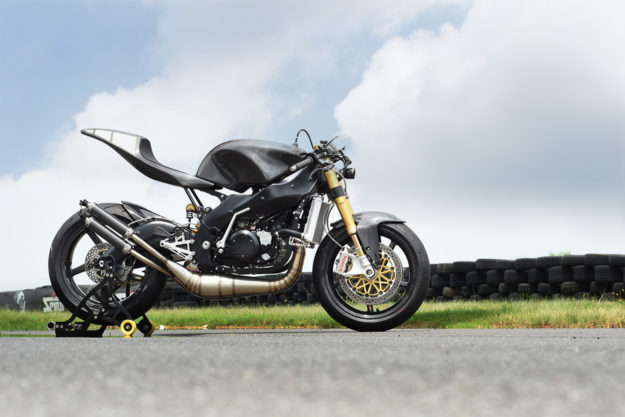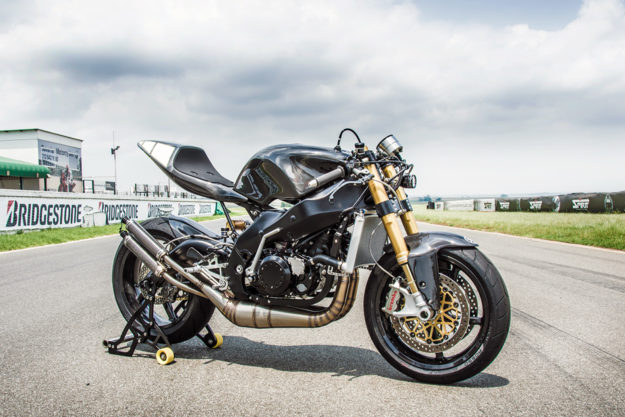
If you’re looking for a track day weapon, there’s a plethora of sportbikes that’ll fit the bill—straight off the showroom floor. But with such a saturated market, it takes something truly exotic to go fast and turn heads.
South African Gareth Evans knows this all too well; his track bike isn’t a brand spanking new Japanese or Italian. Instead, it’s a little bit of both—in the form of this maniacal two-stroke hybrid.
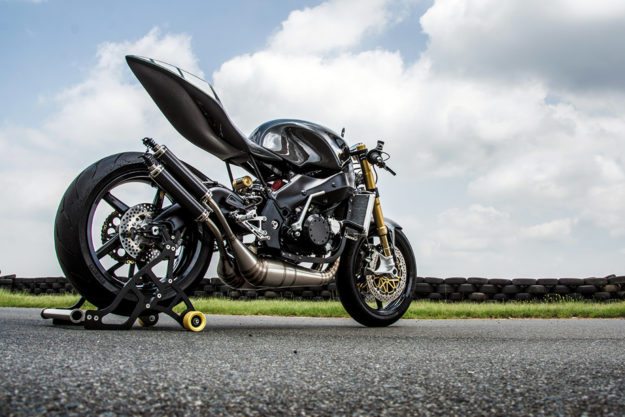
You’re looking at a Yamaha RZ350 motor, wedged into an Aprilia RS250 frame, and wrapped in a mix of hand-made and top-shelf parts. The project was three years in the making, but the seed was planted much further back…
“I grew up on two stroke motorcycles,” Gareth tells us. “I got my first Italjet for my first birthday, and by the time I was three I was churning up ruts in my parents’ garden. I was lucky enough that my parents gave me the opportunity to race bikes throughout my childhood, and supported my interest in bikes.”
“I have always loved two strokes for the sheer fun of the ride—they might not be the fastest around a track compared to the new four strokes with all of the new electronics, but they make up for it in feel, fun, sound and smell.”
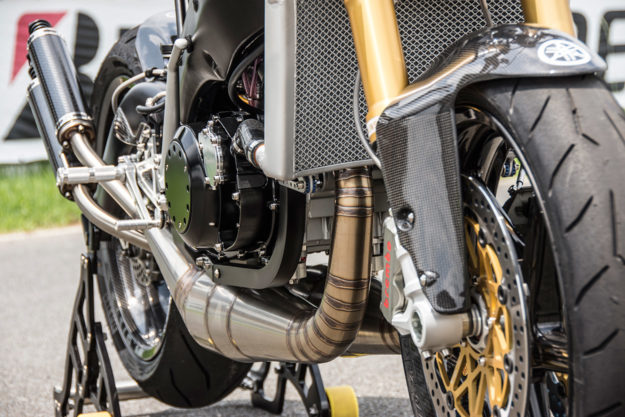
“If you rock up at a track day with the newest superbike you might get one or two interested people. But when I pull this off the trailer at a track day you would not believe the interest—especially from the older generation who also grew up in the two stroke heydays.”
Gareth’s plan was to build a two-stroke racer that would not only look and sound good, but also have the performance to match. His thoughts initially turned to two legendary two-stroke powerplants—Suzuki’s RG500 square four, and Yamaha’s RD500. But after some research, he decided to go for a simpler and lighter twin.
“The Yamaha RZ option was a really nice compromise,” he explains, “with the ability to extract some real power out of the little motor without the weight and complexity of a four cylinder getting in the way.”
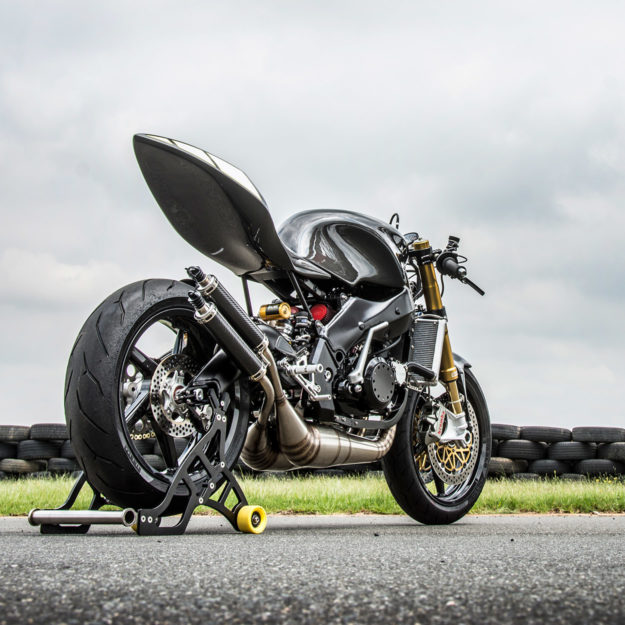
Picking a chassis was far easier; Gareth rates the Aprilia RS among the prettiest 250 production racer frames made, with some of the nicest suspension parts. What’s more, he’d seen this conversion done before.
Ironically though, he ditched all but the 2000-model Aprilia’s frame and swingarm, opting to upgrade the brakes, wheels and suspension. Up front is a set of race-spec Öhlins forks from a Ducati Panigale, matched to an Öhlins TTX rear shock. Since there’s no TTX unit that fits the RS specifically, Gareth had to fabricate his own bottom clevis.
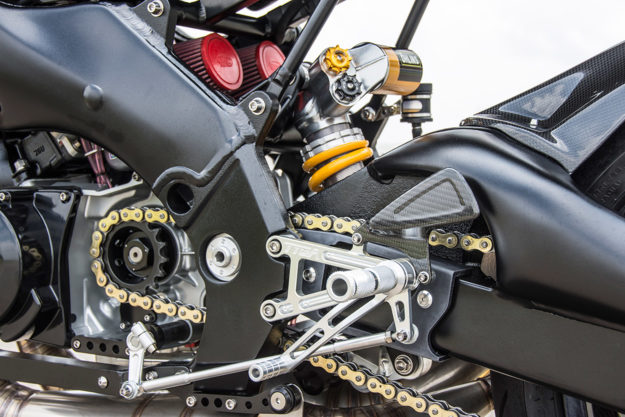
The wheels are carbon items from BST, which needed slight mods to fit. And the brakes are race-spec Brembos, with floating 320mm discs and a RCS 19mm master cylinder. “I have a lot of bikes in my garage—including ones with really good production brakes,” says Gareth, “but these are absolutely ridiculous. It’s like throwing out an anchor!”
There’s also not much left of the Yamaha’s original engine—or rather, engines. Gareth started with four complete motors, and a brand new Banshee casing (identical to the RZ). But the casing had terrible casting marks, so he spent forty hours sanding and filing it by hand. Naturally, he then decided to replace all the internals.
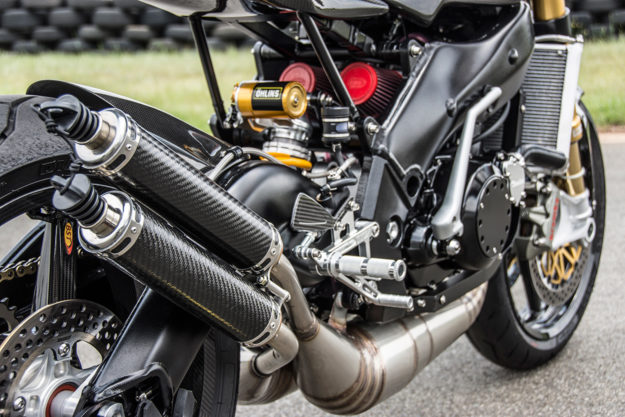
Inside, you’ll find Athena barrels with Wossner pistons, a Hinson billet clutch with straight cut primary gears, a Hot Rods Stroker crank, upgraded bearings, an offset output sprocket, and a new adjustable ignition system. Plus there’s extensive porting and matching work on the cases and cylinders, and the engine is set up to run on low-lead Avgas. Whew.
The carbs are Keihin PWK motocross numbers, fed by BMC filters via custom intakes and V Force 4 reeds. The pipes are from Jim Lomas, and the radiator was dispatched from H20 Performance in Italy—a custom part based on a 3D model created by Gareth. There’s also a custom-made water expansion bottle hiding under the tank, with a Gilera Runner pressure cap.
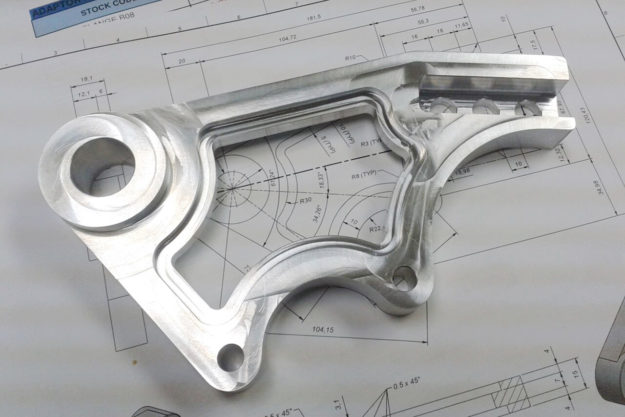
Gareth is a fitter and turner by trade, with a background in mechanical engineering studies. So the number of one-off parts on this build is staggering: the triple clamps, neck pin, rear axle, swingarm pivot, and rear brake carrier were all machined from 7075 aluminum. Plus all the spacers and lock nuts.
Even the chain slider was CNC’ed from a polyethylene billet off a 3D model, since Aprilia no longer manufactures the original part. And every single nut and bolt on the bike is titanium.
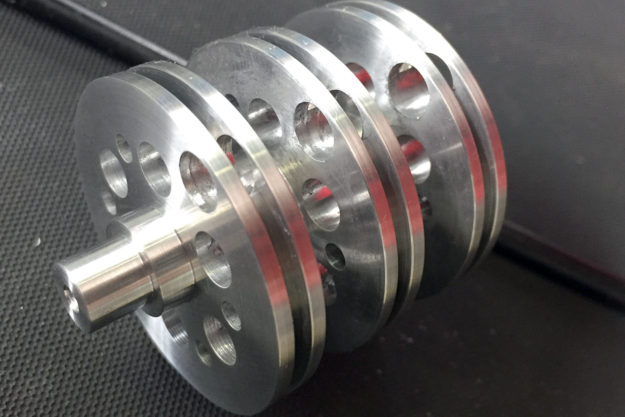
For controls, Gareth fitted a set of Renthal clip-ons and Tyga rear-sets with subtle modifications. There’s a Domino quick-action throttle too, hooked up to a homemade, three pulley splitter system.
The wiring harness is all-new and all custom too, put together from the type of wiring used in aircraft and satellites—just to save a few extra ounces. It runs off an Aliant Lithium-ion battery, which Gareth has to charge at home, since the bike has no charging system. There’s a Stack ST700 gauge up top, in a custom aluminum housing.
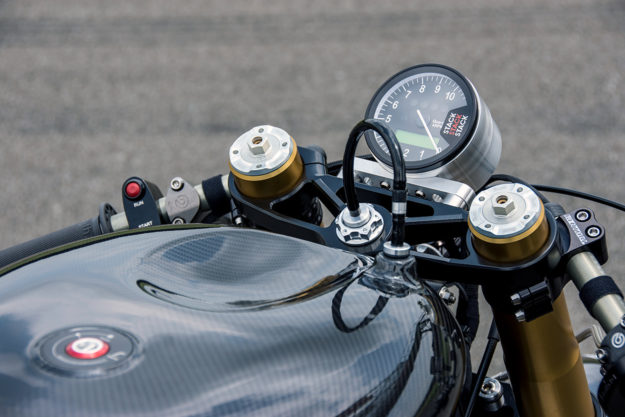
Capping everything off is a homemade subframe, and a full complement of carbon fiber bodywork—including a tail section that would make Sir Mix-a-Lot proud (it weighs less than a kilo, by the way).
I honestly can’t figure out what I’d like more: to hear Gareth’s Yamaprilia at full tilt, or to see the reaction of track day sportbike owners when Gareth gets on the gas and reels them in.
Images by Gerrit Erasmus.
